Related Research Articles
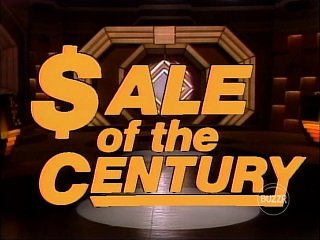
Sale of the Century is an American television game show that originally debuted on September 29, 1969, on NBC daytime. It was one of three NBC game shows to premiere on that date, the other two being the short-lived game shows Letters to Laugh-In and Name Droppers. The series aired until July 13, 1973, and a weekly syndicated series began that fall and ran for one season.
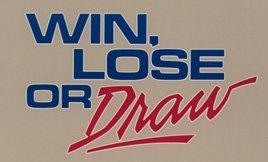
Win, Lose or Draw is an American television game show that aired from 1987 to 1990 in syndication and on NBC. It was taped at CBS Television City, often in Studios 31, 33, and 43 at various times. It was co-produced by Burt & Bert Productions and Kline & Friends for Disney's Buena Vista Television. It has also had two versions on The Disney Channel: Teen Win, Lose or Draw from 1989 to 1992, and a revived version known as Disney's Win, Lose or Draw which aired in 2014.
The Joker's Wild is an American television game show that has aired at different times between 1972 and 2019. Contestants answer questions based on categories determined randomly by a mechanism resembling a slot machine. The show's title refers to the game's slot-machine mechanism also having jokers.

Now You See It is an American television game show created by Frank Wayne for Mark Goodson-Bill Todman Productions. The object of Now You See It is to answer general knowledge trivia questions by finding the answers hidden in a grid, similar to a word search puzzle.

Chain Reaction is an American television game show created by Bob Stewart, in which players compete to form chains composed of two-word phrases.

The Magnificent Marble Machine was an American television game show that featured a giant pinball machine as its centerpiece. The program premiered on NBC on July 7, 1975 at 12:00 pm ET, replacing the short-lived game show Blank Check.
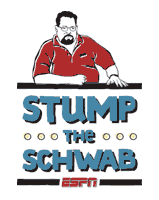
Stump the Schwab is an American game show that aired on ESPN2 and ESPN Classic from July 8, 2004 to September 29, 2006. The show featured three contestants trying to defeat Howie Schwab, ESPN's first statistician, in a sports trivia contest. Stuart Scott was the show's host. The show also appeared on Canada's The Score Television Network.
Fandango is a country music-themed quiz show which aired on The Nashville Network from March 8, 1983 to August 26, 1988, with reruns airing through March 31, 1989, when it was replaced by Top Card. Fandango was the first TV game show to air on TNN and was one of the longest-running game shows on a cable network.
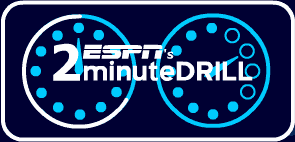
2 Minute Drill is an ESPN game show based on the general knowledge UK game show Mastermind. The program aired from September 11, 2000, to December 28, 2001. ESPN Classic aired reruns of the series daily at 11:30 am Eastern.
Connections is a British game show, devised and produced by John Huntley, that aired on ITV from 26 April 1985 to 6 June 1990. The daytime version is hosted by Sue Robbie from 1985 to 1988 and Simon Potter from 1989 to 1990, while the primetime version is hosted by Richard Madeley.

Temptation was an Australian game show which premiered on the Nine Network on 30 May 2005 and aired at 7.00pm. Hosted by Ed Phillips and Livinia Nixon, the show was a remake of Sale of the Century, which aired on Nine in the same timeslot for more than twenty years between 1980 and 2001. Temptation had the same general format of its predecessor, but with several new features and a deemphasis on the "shopping" aspects of the endgame. The show ran until 30 November 2007, when it was placed on hiatus by the network following strong competition from game show Deal or No Deal on the rival Seven Network; during the hiatus, Nine filled the timeslot with episodes of the American sitcom Two and a Half Men. When Ed Phillips made an appearance on The NRL Footy Show he announced "maybe summer" would be the return of the show. This statement was accurate, as Temptation returned for a shortened fourth series from 1 December 2008 with unaired episodes which were recorded during 2008. During that time, Ed Phillips was dumped by the Nine Network after his contract expired in November, and Temptation never returned to the schedule. After 23 January 2009, when the show's final episode aired, all Temptation websites were removed, and Two and a Half Men returned to Channel Nine's 7:00pm schedule.

You Don't Say! is an American television game show that had three separate runs on television. The first version aired on NBC daytime from April 1, 1963 to September 26, 1969 with revivals on ABC in 1975 and in syndication from 1978 to 1979. The last two incarnations were executive produced by Ralph Andrews and produced and directed by Bill Carruthers.
Sale of the Century was a British game show based on a US game show of the same name. It was first shown on ITV from 9 October 1971 to 6 November 1983, hosted by Nicholas Parsons. Special Celebrity Sale of the Century editions aired occasionally, starting on 2 January 1981 with Steve Jones as host.
The Joke's On Us! is a Canadian game show that aired from 1983 to 1984. It was hosted by Monty Hall, joined by Sylvie Garant as assistant very early on in the run, with Sandy Hoyt as the show's announcer. Taped at Showline Milton Stage in Toronto, Ontario in association with the Global Television Network, the show was created and produced by two American game show veterans, Willie Stein and Nat Ligerman. Each episode featured a rotating panel of four comedians, which included such famous personalities of the day as Alan Thicke, Nipsey Russell, Arte Johnson and Jo Anne Worley.
PDQ and Baffle are American television game shows created by Heatter-Quigley Productions. Both shows' objective was for contestant/celebrity teams to guess a given word or phrase in the shortest amount of time with the fewest letters given as possible.
PopMaster is a popular music quiz on the Ken Bruce Show on BBC Radio 2 that has aired on weekday mornings since February 1998. It usually takes place at around 10:30 every weekday. The questions were originally devised by radio producer and music collector Phil "The Collector" Swern, but are now written by Neil Myners and Simon Bray.
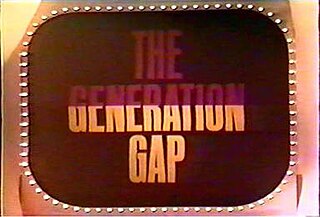
The Generation Gap is a primetime American game show that aired from February 7 to May 23, 1969, on ABC. It was originally hosted by Dennis Wholey, who was replaced by Jack Barry after ten episodes had aired. Fred Foy announced during the entire run.

Pointless is a British television quiz show produced by Banijay subsidiary Remarkable Television for the BBC. It is hosted by Alexander Armstrong with assistance from Richard Osman. In each episode four teams of two contestants attempt to find correct but obscure answers to four rounds of general knowledge questions, with the winning team eligible to compete for the show's cash jackpot. All questions used on the show are factual in nature, and are asked of a panel of 100 individuals in a pre-conducted public survey. A correct answer scores one point for each survey subject who gave it, and the objective is to achieve as low a score as possible. "Pointless" answers, correct responses that were not given by anyone surveyed, score zero points and are the most desirable. Every pointless answer given during the main game increases the jackpot by £250, and the team that reaches the final round has three chances to win it by giving one such answer.

Dadagiri Unlimited is an Indian Bengali language quiz show. The programme has been airing on Zee Bangla since 2009. Sourav Ganguly, the former captain of the India national cricket team and the current president of the Board of Control for Cricket in India, hosted the first two seasons. Actor Mithun Chakraborty replaced him in the third season, but he continued hosting the show replacing Chakraborty from the fourth season onwards.

Ask Me Another is an hour-long radio puzzle game show that was produced by WNYC and National Public Radio. It was hosted by Canadian American comedian Ophira Eisenberg and featured as its "in-house musician" or "one-man house band" independent rock musician Jonathan Coulton. Episodes of the show were usually recorded at The Bell House in Brooklyn, New York, however the show did go to various states across the country and recorded one or more episodes from those locations. The show was produced by WNYC Studios. During the COVID-19 pandemic in the United States, the show continued taping episodes from the homes of the participants, without a studio audience.
References
- ↑ Gerhart, Ann. "True or False: Rumors on TV". Philadelphia Daily News. No. June 4, 1993. Retrieved 21 May 2022.
- ↑ Werts, Diane (June 7, 1993). "Psssst! Rumor Has It It's Piffle". Newsday. Retrieved 21 May 2022.